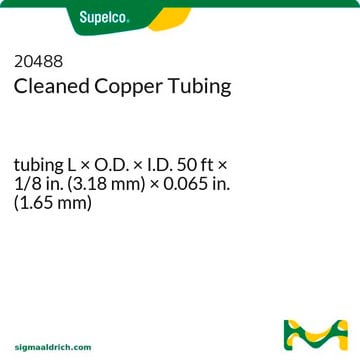360597
2,2,4-Trimetilpentano
ACS reagent, ≥99.0%
Sinónimos:
Isooctano
About This Item
Productos recomendados
grade
ACS reagent
Quality Level
vapor density
3.9 (vs air)
vapor pressure
41 mmHg ( 21 °C)
assay
≥99.0%
form
liquid
autoignition temp.
745 °F
expl. lim.
6 %
impurities
≤0.0003 meq/g Water-soluble titr. acid
≤0.005% S compounds
evapn. residue
≤0.001%
color
APHA: ≤10
refractive index
n20/D 1.391 (lit.)
bp
98-99 °C (lit.)
mp
−107 °C (lit.)
solubility
water: insoluble
density
0.692 g/mL at 25 °C (lit.)
SMILES string
CC(C)CC(C)(C)C
InChI
1S/C8H18/c1-7(2)6-8(3,4)5/h7H,6H2,1-5H3
InChI key
NHTMVDHEPJAVLT-UHFFFAOYSA-N
¿Está buscando productos similares? Visita Guía de comparación de productos
General description
Application
- Synthesis of polyethyleneimine /silica hybrid nanoparticles.
- Amino acid quantification process.
- To dissolve di(2-ethylhexyl) phosphoric acid(DEHPA) to form a solution that is used in the extraction and back extraction of methylene blue.
signalword
Danger
Hazard Classifications
Aquatic Acute 1 - Aquatic Chronic 1 - Asp. Tox. 1 - Flam. Liq. 2 - Skin Irrit. 2 - STOT SE 3
target_organs
Central nervous system
Storage Class
3 - Flammable liquids
wgk_germany
WGK 2
flash_point_f
10.4 °F - closed cup
flash_point_c
-12 °C - closed cup
Elija entre una de las versiones más recientes:
¿Ya tiene este producto?
Encuentre la documentación para los productos que ha comprado recientemente en la Biblioteca de documentos.
Los clientes también vieron
Nuestro equipo de científicos tiene experiencia en todas las áreas de investigación: Ciencias de la vida, Ciencia de los materiales, Síntesis química, Cromatografía, Analítica y muchas otras.
Póngase en contacto con el Servicio técnico






